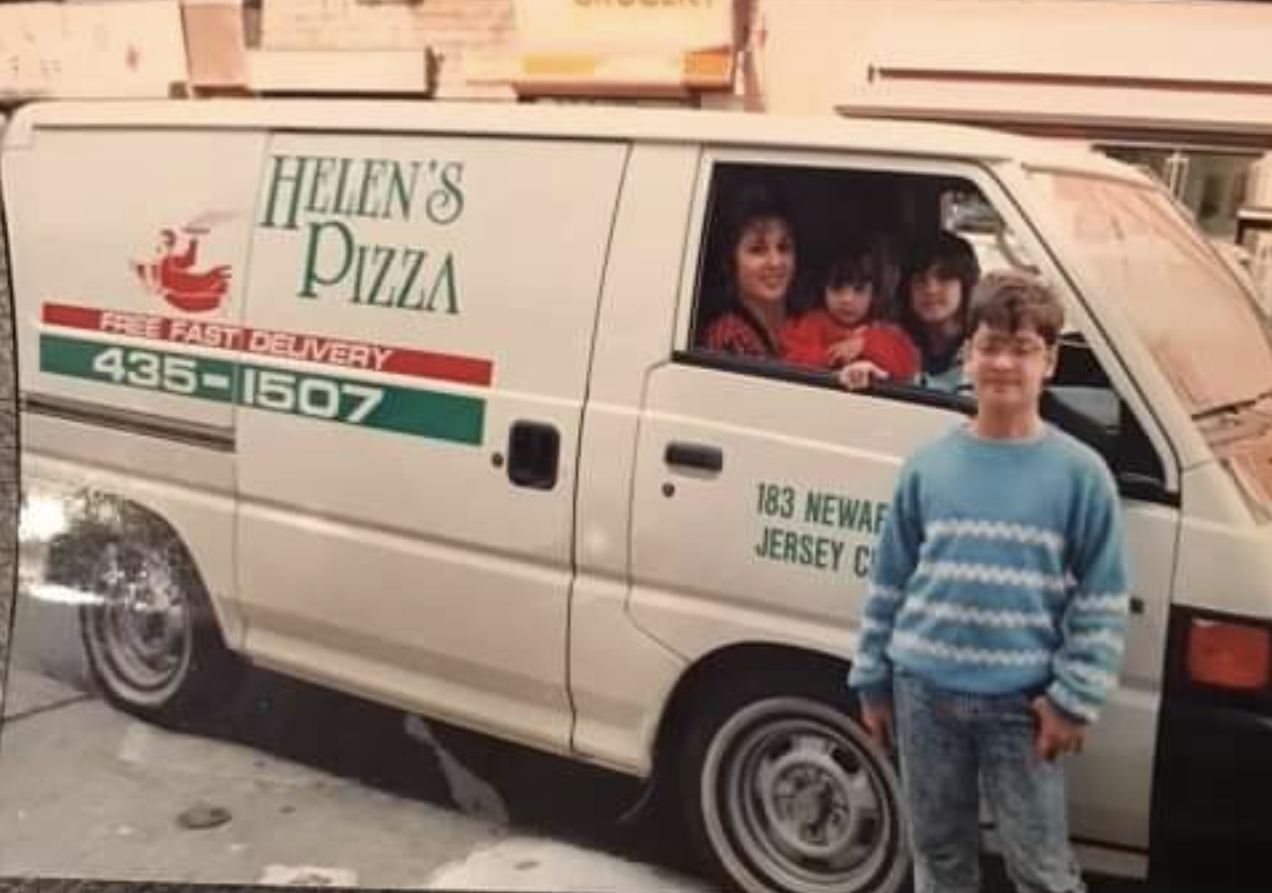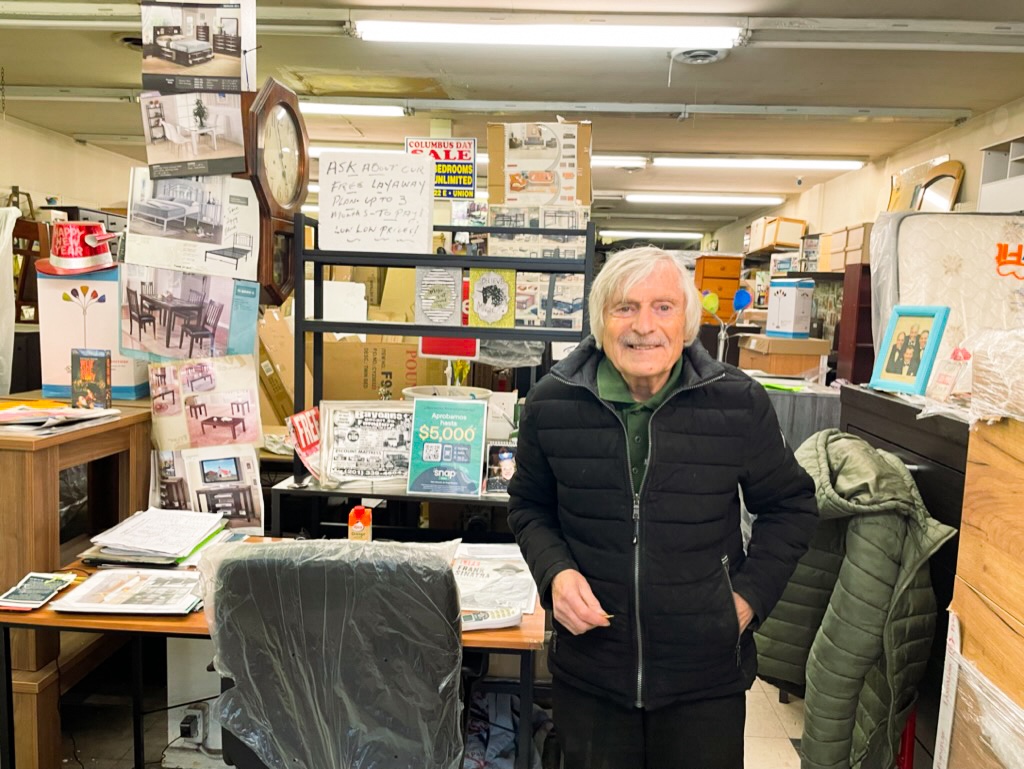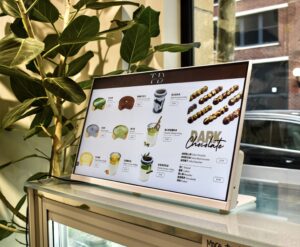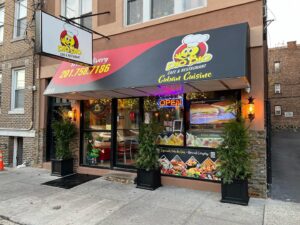Photo by civic engagement storyteller Emma Ferschweiler.
Helen’s Pizza on Jersey City’s Newark Avenue has been slinging pies since 1968 when a slice was only 15 cents.
The business was started by Nicolas Kalcanides, a Greek immigrant who came to America with his wife, two children and an entrepreneurial spirit. Starting from a humble hot dog stand, Kalcanides eventually opened a pizza shop that is a community staple to this day.
Kalcanides’s son, Steven, took over the family business in 1985 but has helped around the shop since he was five. He said there is a sense of pride with keeping the pizzeria in the family. Another generation of Kalcanides now runs the shop after Steven passed management to his son, Nicolas.
“The business is more like part of your home. It’s like your second home,” Steven told Slice of Culture.
Jersey City is among the toughest cities to start a business according to a study published by WalletHub in April. In a ranking of 100 U.S. cities, the sprawling urban municipality placed 98th just under New York City. The rising living costs and limited space makes the business climate a tough landscape for rising entrepreneurs.
“Over the years it’s constantly evolving. Back then it was a really low-income area so the business depended more on … people getting their checks going out and shopping and spending,” Steven said. “Where now you have a different clientele, you have mixed clientele of people.”
Three popular Jersey City businesses have closed down just in the past month: Corgi Spirits, Just Beclaws and Iron Monkey. However, spots like Helen’s Pizza weather through hardships for generations even when faced with a changing economy and pandemic.
Bayonne Furnitureland on Bayonne’s Broadway Avenue started in 1949 by Max Steinberg intending to sell quality furniture at discounted prices.
Since serving 75 years in the community, it is the oldest independently owned furniture store in the city. Max’s son, Bob Steinberg, took over the business as soon as he got out of school and has been running the place since.

“Everybody knows us in town and we have a reputation,” Bob told Slice of Culture. “I try to take care of everybody as much as I can. I do a lot of thing other stores wouldn’t do.”
Walking into Bayonne Furnitureland, it is evident locals have a strong connection to the store. There are articles from The Bayonne Times and The Jersey Journal proudly displayed on shelves, toys are set out for children to come in and play with and customers are immediately greeted by an employee.
The store is also a generational staple for many families. Bob mentioned a customer who said she bought a crib from him 42 years ago for her son who is now an adult.
This special catering to the people is what Bob said makes small businesses like his, special.
“They are unique in a way that when you walk into Home Depot or a department store, nobody talks to you … People like to be catered to,” Bob said.
The Covid-19 pandemic
Like many small businesses, the pandemic forced Bob to close Bayonne Furnitureland to the public and rely on online or phone orders.
Many businesses died during the Covid-19 pandemic and forcing many to adopt a new way of serving customers. Steven said the pizzeria endured well through the shutdowns because the industry was already catered to delivery but other places had to catch up. Now everything can be delivered from alcohol to ice cream to furniture.
Other businesses found support from state and private financial assistance programs to help those impacted by the pandemic. Currently, there are two state programs specifically addressed to Covid-19, the Small Business Improvement Grant and Small Business Lease Grant. These are sponsored by the New Jersey Economic Development Authority in addition to non-pandemic related programs.
More than 10,000 businesses have been helped by the Authority including, but not limited to $44.2 million in grants, low-cost loans and partnerships with investors.
Small businesses also have the support of non-profit organization, New Jersey Community Capital through its Garden State Relief Fund.
Following the pandemic, this program was launched to help small businesses and non-profits recover from the pandemic by providing capital loans. Eligibility is limited to organizations with 3 to 50 employees so those often overlooked by assistance programs can get the help they need.
Even though restrictions have been lifted and Covid-19 seems like history, the pandemic left a lasting imprint on businesses and the economy.
Bayonne Furnitureland has since reopened and now has an online presence on Facebook and a webpage. Bob said everything is online now making competition fierce. Competitors like Amazon or Overstock threaten small businesses like Bob’s store who do not have the same community connection. However, Bayonne Furnitureland has persevered.
“Competition is a different world than it was 20 years ago,” Bob said.
Steven said Helen’s Pizza should continue indefinitely as long as the business evolves with changing times and is able to provide customers what they want and need. One of the consistencies that Steven has maintained through the years is catering products to younger clientele.
While the menu has expanded from simple pizzas and meatball sandwiches, Steven said the products they sell appeal to younger kids so they can eventually bring in their parents.
“Small businesses are tough, it takes a lot of work and a lot of hours, but they’re also very rewarding,” Steven said.












